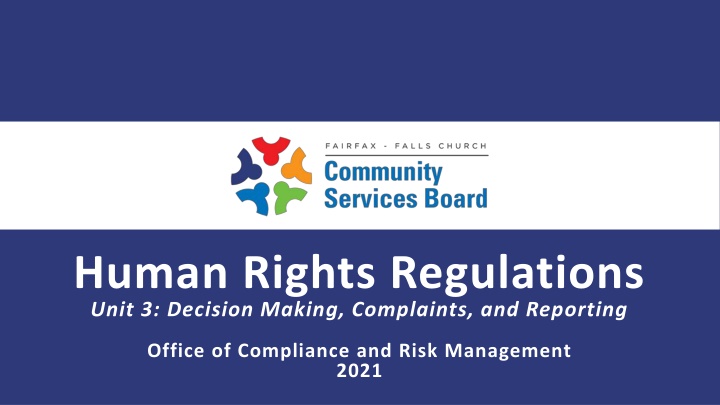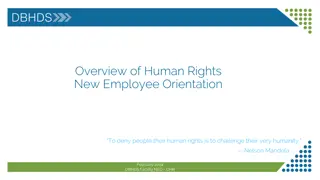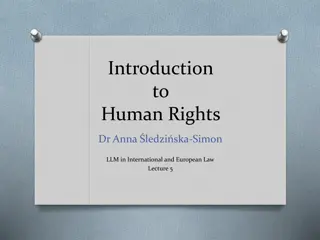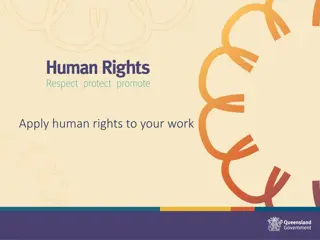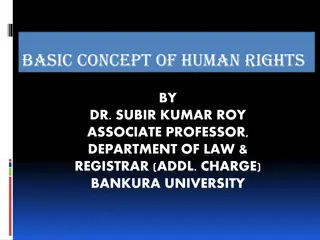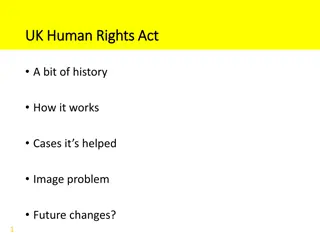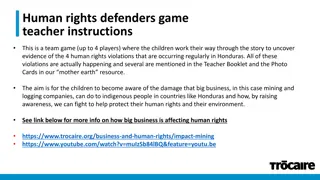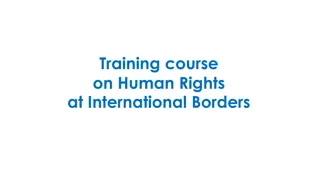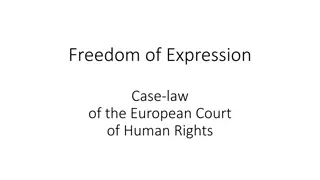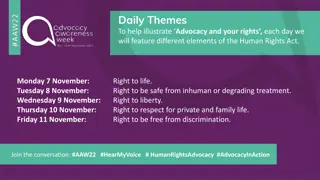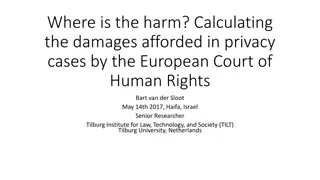Human Rights Regulations
This content covers the determination of an individual's capacity to give consent or authorization, outlining evaluation requirements, frequency, and objections reporting according to regulations. It emphasizes the role of licensed professionals in assessing capacity and the importance of involving Human Rights advocates when objections arise.
Download Presentation

Please find below an Image/Link to download the presentation.
The content on the website is provided AS IS for your information and personal use only. It may not be sold, licensed, or shared on other websites without obtaining consent from the author.If you encounter any issues during the download, it is possible that the publisher has removed the file from their server.
You are allowed to download the files provided on this website for personal or commercial use, subject to the condition that they are used lawfully. All files are the property of their respective owners.
The content on the website is provided AS IS for your information and personal use only. It may not be sold, licensed, or shared on other websites without obtaining consent from the author.
E N D
Presentation Transcript
Human Rights Regulations Unit 3: Decision Making, Complaints, and Reporting Office of Compliance and Risk Management 2021
CSB Mission, Vision and Values COURSE OBJECTIVES Define the Human Rights Principles in accordance with VA DBHDS Recognize the role the Human Rights Principles have in all interactions with individuals served and their family members
CSB Mission, Vision and Values UNIT 3 Decision Making, Complaints, and Reporting TOPIC 1 Overview of Regulations
If the capacity of an individual to consent to treatment, services, or research or to authorize the disclosure of information is in doubt, the provider shall obtain an evaluation conducted by or under the supervision of a licensed professional who is not directly involved with the individual to determine whether the individual has capacity to consent or to authorize the disclosure of information. CSB Mission, Vision and Values 12VAC35-115 Section 145 Determination of capacity to give consent or authorization. 1. Capacity evaluations shall be obtained for all individuals who may lack capacity, even if they request that an authorized representative and/or guardian be designated or agree to submit to a recommended course of treatment. 2. In conducting this evaluation, the professional may seek comments from representatives accompanying the individual pursuant to 12VAC35-115-70 A 4 about the individual's capacity to consent or to authorize disclosure. 3. Providers shall determine the need for an evaluation of an individual's capacity to consent or authorize disclosure of information and the need for a substitute decision maker whenever the individual's condition warrants, the individual requests such a review, at least every six months, and at discharge, except for individuals receiving acute inpatient services. 4. Capacity evaluations shall be conducted in accordance with accepted standards of professional practice and shall indicate the specific type of decision for which the individual's capacity is being evaluated (e.g., medical) and shall indicate what specific type of decision the individual has or does not have the capacity to make. 5. If the individual or their family objects to the results of the licensed professional's determination, the provider shall immediately inform the Human Rights advocate. See code section for full regulation
Section 145 Review Section 145 outlines determination of capacity to give consent or authorization. The information below highlights a few items from the regulation: A capacity evaluation must be obtained: When condition warrants When an evaluation is requested At least every 6 months Annually if capacity s not expected to be regained At discharge Except acute inpatient care Evaluation's must be performed by a licensed professional not involved in care Report objections to the OHR
A. When it is determined that an individual lacks the capacity to consent or authorize the disclosure of information, the provider shall recognize and obtain consent or authorization for those decisions for which the individual lacks capacity. CSB Mission, Vision and Values 12VAC35-115 Section 146 Authorized representation. B. If an attorney-in-fact, health care agent or legal guardian is not available, the director shall designate a substitute decision maker as authorized representative and/or guardian. C. No director, employee, or agent of a provider may serve as an authorized representative and/or guardian for any individual receiving services delivered by that provider unless the authorized representative and/or guardian is a relative or the legal guardian. D. The provider shall document the recognition or designation of an authorized representative and/or guardian in the individual's services record, including evidence of consultation with the individual about their preference, copies of applicable legal documents such as the durable power of attorney, advance directive, or guardianship order, names and contact information for family members, and, when there is more than one potential family member available for designation as authorized representative and/or guardian, the rationale for the designation of the particular family member as the authorized representative and/or guardian. E. If a provider documents that the individual lacks capacity to consent and no person is available or willing to act as an authorized representative and/or guardian, the provider shall identify a suitable person or ask the court to authorize treatment. F. Court orders authorizing treatment shall not be viewed as substituting or eliminating the need for an authorized representative and/or guardian. G. Whenever an individual has regained capacity to consent as indicated by a capacity evaluation or clinical determination, the director shall immediately remove any authorized representative and/or guardian, notify the individual and the authorized representative and/or guardian, and ensure that the services record reflects that the individual is capable of making their own decisions.See code section for full regulation
Section 146 Review If there is a lack of capacity, consent/ authorization must be obtained from: An attorney-in fact A healthcare agent A legal guardian A family member can be designated as a substituted decision maker. The individual's preference must be considered. If there is no preference, the best qualified family member must be designated: A spouse, adult child, parent, adult sibling, other relative
Section 146 Review If there is a lack of capacity, consent/ authorization must be obtained from an attorney-in fact, a healthcare agent, or a legal guardian. A family member can be designated as a substituted decision maker. However, the individual's preference must be considered. If there is no preference, the best qualified family member must be designated this could be a spouse, adult child, parent, adult sibling, other relative. Designation of a next friend is appropriate if there is no qualified family member. However, the following requirements must be met; shared residence (within two year period), regular contact, individual must not object, must appear before LHRC, and accept responsibilities. No provider can be the authorized representative and/or guardian unless they are a relative or legal guardian. A provider can petition the court for an authorized representative and/or guardian if no one else has been identified.
A. Each individual has a right to: CSB Mission, Vision and Values 12VAC35-115 Section 175 Human rights complaint process. 1. Make a complaint that the provider has violated any of the rights assured under this chapter; 2. Have a timely and fair review of any complaint in accordance with this chapter and the program's Human Rights complaint resolution policies and procedures; 3. Have someone file a complaint on their behalf; 4. Use these and other complaint procedures; and 5. Make a complaint under any other applicable law, including to the protection and advocacy agency. B. The individual shall: 1. Be contacted by the director or the director's designee regarding the complaint within 24 hours; 2. Have access to a Human Rights advocate for assistance with the complaint; 3. Be protected from retaliation and harm; 4. Have the complaint reviewed, investigated, and resolved as soon as possible; 5. Receive a report with the director's decision and action plan within 10 working days; and 6. Be notified in writing of their right to and the process for appealing the director's decision and action plan to the LHRC. See code section for full regulation
C. Upon receipt of a complaint, providers shall: CSB Mission, Vision and Values 12VAC35-115 Section 175 Human rights complaint process. 1. Notify the department of the complaint as soon as possible, but no later than the next business day; 2. Ensure that the director or the director's designee contacts the individual regarding the complaint within 24 hours; 3. Initiate an impartial investigation into, or resolution of, the complaint as soon as possible, but no later than the next business day; 4. Take all steps necessary to ensure that individuals involved in the complaint are protected from retaliation and harm; 5. Assist the individual making a complaint in understanding the Human Rights complaint process, the provider's complaint resolution policies and procedures, and the confidentiality of involved information; 6. Ensure that all communications to the individual are in the manner, format, and language most easily understood by the individual; 7. Adhere to the reporting requirements in 12VAC35-115-230; and 8. Report the director's decision and action plan within 10 working days to the individual, authorized representative and/or guardian, if applicable, and Human Rights advocate. See code section for full regulation
F. Additional requirements for complaints involving abuse, neglect, or exploitation: CSB Mission, Vision and Values 12VAC35-115 Section 175 Human rights complaint process. 1. The program director shall take immediate steps to protect the individual until the investigation is complete, including appropriate personnel actions. 2. Any instance of seclusion or restraint that does not comply with this chapter or an approved variance, or that results in injury to an individual, shall be reported to the authorized representative and/or guardian, as applicable, and the department in accordance with the requirements for reporting allegations of abuse. 3. The program director shall notify the department and authorized representative and/or guardian, if applicable, of an allegation of abuse or neglect within 24 hours of the receipt of the allegation. 4. The program director shall ensure that the investigation is conducted by a person trained to do investigations and who is not involved in the issues under investigation. 5. The investigator shall provide a written report of the results of the investigation of abuse or neglect to the director and to the Human Rights advocate within 10 working days from the date the investigation began unless an extension has been granted. 6. The program director shall decide, based on the investigator's report and any other available information, whether the abuse, neglect, or exploitation occurred. Unless otherwise provided by law, the standard for deciding whether abuse, neglect, or exploitation has occurred is preponderance of the evidence. 7. The program director shall submit the final decision and action plan, if applicable, to the individual, authorized representative and/or guardian, if applicable, and Human Rights advocate within 10 working days of its completion.See code section for full regulation
Section 175 Review Individuals have the right to : Make a complaint Have access to the OHR Be protected from retaliation & Harm Timely review, investigation of the complaint Receive a report of the outcome of the investigation Complaints (against assured rights): Reported no later than the next business day Addressed with individual within 24 hours of receipt Individual must be protected throughout the investigation Initiate investigation no later than the next business day Results documented within 10 working days
CSB Mission, Vision and Values 12VAC35-115 Section 180 Local Human Rights committee hearing and review procedures. Any individual or their authorized representative and/or guardian who disagrees with a director's final decision or action plan resulting from any complaint resolution process under this chapter may request an LHRC hearing by following the process described in this section. See code section for full regulation
Section 180 Review This section outlines procedures and timelines by the Local Human Rights Committee. If the individual and/or their authorized representative and/or guardian elects to appeal the final directors findings and/or action plan as it relates to the Human Rights process of the investigation. LHRC hearing is not a legal matter. It conducts informal fact-findings hearings to identify and violations to the regulations. Should either the individual or the provider not agree with the findings of LHRC, either party can appeal to the State Human Rights. The SHRC does not listen to any new evidence. Their role is to ensure that the LHRC followed procedures and that the procedures were appropriate. The findings of the SHRC is final.
A. Variances to these regulations shall be requested and approved only when the provider has tried to implement the relevant requirement without a variance and can provide objective, documented information that continued operation without a variance is not feasible or will prevent the delivery of effective and appropriate services and supports to individuals. CSB Mission, Vision and Values 12VAC35-115 Section 220 Variances. B. Only directors may apply for variances, and they must first be approved by the provider, the governing body of the provider, or the commissioner, as appropriate, before consideration by an LHRC or the SHRC. C. Upon receiving approval from the governing body or commissioner, and after notifying the Human Rights advocate and other interested persons, the director shall file a formal application for variance with the LHRC. D. Directors shall implement any approved variance in strict compliance with the written application as amended, modified, or approved by the SHRC. E. Providers shall develop policies and procedures for monitoring the implementation of any approved variances. F. The decision of the SHRC granting or denying a variance shall be final. G. Following the granting of a variance, the provider shall notify all individuals affected by the variance about the details of the variance. H. If an individual is in immediate danger due to a provider's implementation of these regulations, the provider may request a temporary variance pending approval pursuant to the process described in this section. See code section for full regulation
Section 220 Review Section 220 is all about variances. Variances to the regulations, may be approved, but only after the provider has completed their due diligence. Any provider seeking a variance needs to complete a formal application with the LHRC. After LHRC has reviewed it, they will then submit it to SHRC for their review and approval. Any variance that is approved is only permitted for specific time frames and needs to be reviewed annually. If approved, strict compliance is expected, and any affected individuals must be notified.
A. Providers shall collect, maintain, and report the following information concerning abuse, neglect, and exploitation: CSB Mission, Vision and Values 12VAC35-115 Section 230 Provider requirements for reporting. 1. report allegations of abuse and neglect via the department's web-based reporting application in accordance with all applicable operating instructions issued by the commissioner or their designee. 2. report each allegation of abuse or neglect within 24 hours of receipt of the allegation 3. provide a written report of the results of the investigation of abuse or neglect to the director and Human Rights advocate This report shall include: a) Whether abuse, neglect, or exploitation occurred; b) The type of abuse; and c) Whether the act resulted in physical or psychological injury. B. Providers shall collect, maintain, and report the following information concerning deaths and serious injuries: 1. report to the department deaths and serious injuries in accordance with all applicable operating instructions issued by the commissioner or their designee. 2. report deaths and serious injuries in writing to the department within 24 hours of discovery and by telephone to the authorized representative and/or guardian within 24 hours. 3. All reports of death and serious injuries shall include: a) Date and place of the death or serious injury; b) Nature of the injuries and treatment required; and c) Circumstances of the death or serious injury See code section for full regulation
3. Providers shall collect, maintain and report the following information concerning seclusion and restraint: CSB Mission, Vision and Values 12VAC35-115 Section 230 Provider requirements for reporting. 1. report each instance of seclusion or restraint or both in accordance with all applicable operating instructions issued by the commissioner or their designee. 2. submit an annual report of each instance of seclusion or restraint or both by the 15th of January each year, or more frequently if requested by the department. 3. Each instance of seclusion or restraint or both shall be compiled on a monthly basis and the report shall include: a) Type or types b) Rationale for the use of seclusion or restraint c) Duration of the seclusion or restraint 4. Any instance of seclusion or restraint that does not comply with this chapter or approved variances, or that results in injury to an individual, shall be reported to the authorized representative and/or guardian, as applicable, and to the department via the department's web-based reporting application within 24 hours. See code section for full regulation
Section 230 Review Section 230 reviews provider requirements for reporting. Here are a few highlights from this section: Providers must collect, maintain, and report the allegations regarding abuse or neglect. All allegations must be submitted to the Office of Human Rights within 24 hours of receipt of the allegation. The investigator must submit a written investigative report within 10 working days. In addition, providers must collect, maintain, and report on the use of seclusion and restraints. This includes, each instance of seclusion and restraint as well as the types of restraint, rationale for use, and duration.
A. Providers, through their directors, shall: CSB Mission, Vision and Values 12VAC35-115 Section 260 Provider and department responsibilities. 1. Designate a person or persons responsible for helping individuals exercise their rights and resolve complaints regarding services; 2. Take all steps necessary to perform duties required by, and ensure compliance with, this chapter in all services provided; 3. Post information in program locations about the existence and purpose of the Human Rights program; 4. Communicate information about the availability of a Human Rights advocate to individuals and authorized representative and/or guardians 5. Ensure access, as needed, to the LHRC for all individuals receiving services; 6. Provide the Human Rights advocate unrestricted access to an individual and their services records whenever the advocate deems access is necessary to carry out rights protection, complaint resolution, and advocacy on behalf of the individual; 7. Require competency-based training of employees on this chapter upon employment and at least annually thereafter. 8. Comply with all state laws governing the reporting of abuse and neglect and all procedures set forth in this chapter for reporting allegations of abuse, neglect, or exploitation; 9. Submit to the Human Rights advocate for review and comment proposed policies, procedures, or practices that may affect individual Human Rights; 10. Ensure appointment of a designated liaison to, and appropriate staff participation with, the LHRC, as required; See code section for full regulation
Providers shall require their employees to: CSB Mission, Vision and Values 12VAC35-115 Section 260 Provider and department responsibilities. 1. Become familiar with this chapter, comply with it in all respects, and help individuals understand and assert their rights; 2. Protect individuals from any form of abuse, neglect, or exploitation by: a) Not abusing, neglecting, or exploiting any individual; b) Using the minimum force necessary to restrain an individual; c) Not permitting or condoning anyone else abusing, neglecting, or exploiting any individual; and d) Reporting all suspected abuse, neglect, or exploitation to the director; and 3. Cooperate with any investigation, meeting, hearing, or appeal held under this chapter. Cooperation includes giving statements or sworn testimony. See code section for full regulation
Section 260 Review Section 260 reviews provider and department responsibilities. Here are a few highlights from this section: Provide OHR unrestricted access to individuals and their services record. Require competency-based training of staff, at start of employment and at least annually thereafter. Documentation must be maintained. Provide proposed policies, procedures for review Cooperate with the OHR and LHRC to investigate and correct conditions concerning Human Rights. Comply with SHRC, LHRC, OHR requests. Be familiar with HRR Protect individuals from abuse and neglect Cooperate with any investigation, meeting, hearing or appeal.
CSB Mission, Vision and Values UNIT 3 Decision Making, Complaints, and Reporting TOPIC 2 Complaints versus Violations
Issues and Grievances Not every concern or problem with services is a Human Rights compliant or violation. Issue: A point in question or a matter that is in dispute but is not related to Human Rights. Example: In a residential facility, an individual would like a different dinner meal rooted in preference rather than the meal prepared for the evening. Grievance: Unresolved issues that are not related to Human Rights may be categorized as a grievance. Please note, there is a CSB process for grievance resolution. Example: A program repetitively schedules the same meal. An individual has expressed that they don t care for it but doesn t mind if it s on the menu occasionally but does mind if it is constantly on the menu.
Complaints and Violations Complaint: An allegation of a violation of a Human Rights regulation or CSB policy Example: An individual has complained that a CSB staff member has talked to the individual s mother about the individual s service plan without the person s permission Violation: A founded action that adversely affected the Human Rights of an individual or posed an imminent and substantial threat to the health, safety, or welfare of the individual Example: Upon examination, it was found that an individual s confidential information was released to a family member without the individual's authorization
Complaint and Violation Facilitation Help resolve all complaints at the lowest level The Human Rights regulations only cover individuals in a licensed service However, the CSB grievance process may be used for other complaints Apply the same philosophical approach and tenets of Human Rights to all people served Use your organizational supports for guidance Your organizational supports will address questions and help you determine which resolution process is appropriate (CSB grievance or Human Rights process) Err on the side of caution with any suspected abuse, neglect or exploitation The experts will determine the outcome (CPS, APS and/or Human Rights representatives) What s your role, legal obligation, and responsibility? Help resolve issues Support Human Rights of all served Help, encourage, and support individuals to know and exercise their rights!
CSB Mission, Vision and Values UNIT 3 Decision Making, Complaints, and Reporting TOPIC 3 Reporting Requirements
Required Reporting A first-person account of the incident does not literally mean the eyewitness. It means the first person who observed or was informed about an incident. Whoever observed or was informed of the event must report the incident. Consult with your supervisor about what has occurred and next steps. A Serious Incident Report may be necessary. Follow the agency procedures about the process of Serious Incident reporting. Talk to your supervisor regarding issues of Duty to Protect.
Mandated Reporting Allegations or suspected violations must be reported to the proper authorities. Consult with organization supports such as the Office of Compliance and Risk Management (OCRM) and the program leadership for your specific division for clarification. Depending on the situation, mandated reporting could include: Serious Incident Report Child Protective Services (CPS) Adult Protective Services (APS) State Reporting Web Based Forms Other State forms or procedures for other categories of violations Police regarding sexual and assault allegations
Your Role as a Facilitator All staff members are required to facilitate Issues and Complaints. Facilitation includes mandatory reporting of a witnessed staff or individual-to-individual action or complaint that is a potential Human Rights violation. Witnessed includes seeing the event, being present for the event, or being told about the event by an individual or family member served. Facilitate resolution of issues and complaints at the closest point of origin as soon as possible. A dispute resolution process is used to resolve grievances (unresolved non-Human Rights issues and programming that is not licensed by DBHDS). CSB Regulation 3040.4 outlines the compliant process for staff. Check the internal CSB SharePoint pages for more information.
Facilitating Issues and Complaints All CSB staff facilitate Issues and Complaints by: Listen or observe the issue or complaint Ensure safety and well-being first and foremost Explain next steps/options related to the issue or complaint Report complaints, observations, or issues on behalf of an individual Try to help the individual resolve the complaint
Your Responsibility Support Human Rights of all served Help, encourage, and support individuals to know and exercise their rights! You are required to report potential/suspected violations immediately Vast majority of violations are: Things people overlook Things people are not aware of how to handle, and/or Unintentional Think about what kind of resolution the individual is seeking. The goal is to resolve issues quickly and help an individual with the complaint process.
Process and Resolution Process Resolution All individuals have a right to: Initiate a complaint about a violation of Human Rights Have a timely and fair review of their complaint Have someone else file a complaint on their behalf The individual: Must be contacted within 24 hours by the director or director s designee acknowledging the complaint Have access to a Human Rights advocate Be protected from retaliation and harm Within 10 working days, receive a report with the director s decision and action plan
Investigators Role & Process The director or designee will assign an investigator The investigation is a fact-finding process with recommendations for an action plan Feeds into the agency Compliance system Often includes a review of related policies or procedures that may have contributed to the event Designated staff members, generally Compliance staff members, review Complaints Specialized training is required for Human Rights Investigators
REVIEW R.I.G.H.T.S. CSB Mission, Vision and Values Respect rights in every exchange Rights for individuals with disabilities is historically new Intercede in any contrary actions Listen, observe, facilitate Guide individuals in exercising their Rights Be vigilant Help resolve issues at the first opportunity As soon as possible Think about the guiding principles of services that underscore Human Rights Ask your supervisor for guidance if you are unsure Satisfaction by the individual within services received Eliminate jargon Seek every opportunity for improvement
CSB Mission, Vision and Values Next Section Complete Final Assessment
